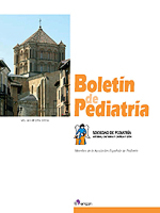Conocimientos sobre el tratamiento médico del asma en padres de niños asmáticos
M.T. Leonardo Cabello , R. Sancho Gutiérrez , L. García Higuera , E. Pérez Belmonte , M.J. Cabero Pérez
Bol. Pediatr. 2014; 54 (229): 168 - 172
Objetivo. Determinar el grado de conocimiento sobre el tratamiento del asma de los padres de niños/as asmáticos seguidos en una consulta de Neumología infantil. Material y método. Estudio descriptivo y transversal, mediante encuestas autocumplimentadas. Los conocimientos se evaluaron usando el Newcastle Asthma Knowledge Questionnaire (NAQK). Para analizar el conocimiento concreto sobre el tratamiento del asma, hemos seleccionado las preguntas 10, 11, 12, 18, 19, 20, 27 y 31 del NAQK que hacen referencia tanto al tratamiento de la crisis como al tratamiento de mantenimiento del asma. Se realizó el cuestionario a padres y otros familiares de niños asmáticos atendidos en la consulta de Neumología infantil de un hospital terciario. Resultados. La muestra quedó conformada por 344 cuestionarios. En cuanto al manejo de la crisis aguda, solo el 39,2% ha identificado correctamente los fármacos indicados. Solo el 33,4% sabe que los medicamentos inhalados tienen menos efectos secundarios que los orales, un 63,7% conoce que los ciclos cortos de corticoides no tienen efectos secundarios importantes y el 66% afirma que el Ventolín® no daña el corazón. Respecto al tratamiento de mantenimiento del asma, el 63,1% sabe que los antibióticos no son una parte importante del tratamiento. Hasta un 57% de los padres no son capaces de indicar dos tratamientos de mantenimiento para el asma. El 95% sabe que con el tratamiento adecuado un niño asmático puede llevar una vida normal y el 82,6% afirma que los niños con síntomas frecuentes de asma deberían tomar tratamiento preventivo. Conclusiones. La realización del NAQK permite evaluar los conocimientos sobre asma que tiene nuestra población y esta información es útil para una intervención educativa posterior.
Knowledge that parents of asthmatic children have about medical treatment of asthma
Objective. To determine the grade of knowledge that parents of asthmatic children seen in a child pneumology medical office have on the treatment of asthma.
Material and methods. A descriptive and cross-sectional study was made using self-filled out surveys. Knowledge was evaluated with the Newcastle Asthma Knowledge Questionnaire (NAQK). To analyze specific knowledge on the treatment of asthma, we selected questions 10, 11, 12,18, 19, 20, 27 and 31 of the NAQK that refer to treatment of the episode and maintenance treatment of the asthma. The questionnaire was administered to parents and other family members of asthmatic children seen in the child Pneumology medical office of a tertiary hospital.
Results. The sample was made up of 344 questionnaires. Regarding the management of the acute episode, only 39.2% had correctly identified the drugs indicated. Only 33.4% knew that inhaled medications have fewer side effects than oral ones. A total of 63.7% knew that the short cycles of corticosteroids do not have significant side effects and 66% stated that Ventolín® did not harm the heart. Regarding maintenance treatment of asthma, 63.1% knew that antibiotics are not an important part of the treatment. Up to 57% of the parents were not capable of indicating two maintenance treatments for asthma and 95% knew that an asthmatic child could live a normal life with adequate treatment. A total of 82.6% stated that children with frequent symptoms of asthma should take preventive treatment.
Conclusions. Performance of the NAQK makes it possible to evaluate knowledge on asthma that our population has. This information is useful for a subsequent education intervention.
Artículo completo (PDF) (662 kb.)
- Neumología
